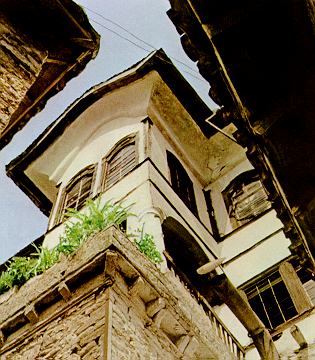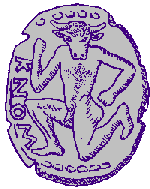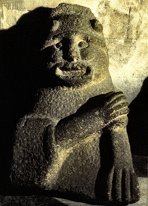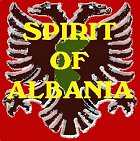
Albania, O Albania, please
work out what you are !
Once you were The Eagles' Realm - now you're a stolen car.
ALBANIAN POEMS OF DISSIDENCE
by
Trifon Xhagjika, Gazmend Elezi,
Namik Mane,
Bilal Xhaferri, Ismail Kadare
and others
To read this page properly, please ensure that the character encoding
of your browser is not set to the default 'Unicode'.
3.
|
TRIFON
XHAGJIKA
(1932-1963)
translated by Zana Banci and Anthony Weir I
can't, I
saw my fatherland Help
me to be happy. (1963)
Trifon
Xhagjika (pronounced
'Dzajika') came from 'humble origins' in the village of Zagoria
near Gjirokastër. Under the communist régime he was
able to get to university in Tirana, and went on from there to
an administrative job in the army. He was arrested in 1963 together
with members of a Communist youth group and was executed by firing-squad.
Although poetry was his passion, very little of his work was published,
and much has been lost. Some were published in 1994 under the
title ATDHEU ESHTË LAKURIQ (My Fatherland is Naked).
Here is the Albanian version of the title-poem: E
mora për dore
|

4.
|
GAZMEND ELEZI translated by Zana Banci and Anthony Weir
HAPPINESS It is so perfect So much hope ! Always right beside
us,
ALBANIAN VERSION:
LUMTURIA Kaq
e perkryer, |

5.
|
NAMIK
MANE translated by Zana Banci and Anthony Weir
WAS THERE EVER A CAMP ? Was there ever
a camp without the desire to have wings Ten thousand square
miles fenced in and patrolled Ideals crushed People, I'm broken Step on me!
THE MOMENT
SO YOU WANT THE SONG OF TRIUMPH So you want the
sacred song of triumph - Waiting for tomorrow
to come Hands bleeding
SOLITUDE I don't chew people
with the jaws of loneliness - Loneliness changes
Having written these poems
during his internment, Namik Mane buried them. Most of his friends
(in the Communist Youth Group) were arrested and killed under
the Hoxha régime. Albania was in reality on a war-footing during much of the paranoid Hoxha period, because it was isolated, estranged from post-Stalinist, 'revisionist' Russia and the Soviet Satellites, estranged from even-more-revisionist Yugoslavia which virtually surrounded it (and had tried to gobble it up just after the Second World War), and of course totally apprehensive of the old enemy Greece, a member of NATO, which had already swallowed up and ethnically cleansed half its territory. The borders, especially near Greece, were wired and patrolled, the waters of the Straits of Corfu swept nightly with searchlights to deter or find defectors. Security Alerts (an excellent method of terror) were almost a daily occurrence, and when the dreaded sirens sounded, everyone had to drop everything and assemble in designated spots. The whole society was riven by fear. Albania's old feudal system had been crudely replaced by a dictatorship in which half the people spied on the other half. A repeated, half-heard joke - or even a grudge - was enough to send someone for years to a prison camp - or to oblivion. Because Albania is such a tiny, truncated country, such a dictatorship was utterly devastating - and it will take at least a generation for its people to recover from the trauma. Hoxha was one of a select group of Ultra-dictators whose membership includes the utterly-malignant Josip Stalin, Adolf Hitler, 'Papa Doc' Duvalier, Saddam Hussein, Pol Pot, Georghiu Ceauçescu and Juán Batista of Cuba - plus various South American mass-murdering presidents backed or even put into power by the United States. Namik Mane's poems speak for the victims of all these - and some 'democratic' - régimes where people are held without trial or any recourse to uncorrupt (or any) legal defence.
ALBANIAN VERSIONS: NË CILIN KAMP Në
cilin kamp nuk lindi dëshira për të fluturuar Njëzete
e tetë mijë kilometra katëror mbërthyer
me tela
Shokët
janë mbledhur në grupe: Me solli tek ti kënga e tyre. E
dashur ta nisa një leter.
Doni
këngën e shenjtë të triumfit. Prisni
që nesër të vijë ndonjë tjeter Më vjen keq! Plagë
kemi duart
Unë
nuk pertyp njerëz me nofullat e vetmisë Ne
vetmi trajta reale me merr fantazia
|

6.
|
BILAL
XHAFERRI translated by Zana Banci and Anthony Weir
Small
nation And
throughout the land
DISTANT STATION Distant
station in a field: Who
am I hoping for tonight ? In
this rain Thus,
far from those that loved me,
MY HOMELAND Like
a shroud The
glistening stars I
fled it like a lover My
poems were as golden gifts The
glistening stars I
fled it like a lover
COME, SADNESS Come, sadness Come
slowly Come
slowly Come, sadness Come
like nearing thunder in the night Come, sadness O
you my beloved who has never abandoned me Come, sadness Sadness,
come.
ALBANIAN VERSIONS: SHQIPËRI 1976 Vend
i vogël Errësirë
e madhe Dhe
rrugëve të atdheut
NË STACIONIN E LARGËT Në
stacionin e largët në fushë, Kë
pres unë sonte?
Më kot më shkon mendja Asnjëri Ja,
kështu do më rrjedhë tërë jeta,
ATDHEU E
para mjegull e Shtatorit Si
djerse të ftohta ndrinin natën Ashtu
të lashe i shtrenjti vend Floriri
i vargjeve të mia Si
djersë të ftohta ndrinin natën Ashtu
të lashe i shtrenjti vend
EJA TRISHTIM Eja, trishtim Eja
me hapa fletësh qe bien nga degët Eja, trishtim Eja
me hapa tingujsh qe dridhen në mbrëmje Eja, trishtim O
preher i embël që nuk më braktise kurrë Eja, trishtim Trishtim, eja.
|

7.
ISMAIL
KADARE
1936-
translated
by Zana Banci and Anthony Weir
Kliko këtu për versionin shqip.
THE FLIGHT OF THE WILD
GEESE
Flying off, they form
the only letter that they know:
the glorious V.
They've left something
behind.
They've taken something, too.
Thank you, geese,
for what you've done for us.
With just one letter
in the illimitable sky
you express our yearning
more than a thousand books.
ALBANIAN
VERSION
FLUTURIM I PATAVE RE EGRA NE FORME V-JE
E krijuan
gërmën
E vetme që dinë:
V-në superbe
Dhe u nisën për fluturim.
Diçka
lënë pas
Diçka marrin mbi re.
Faleminderit, pata,
Për aq sa bëtë per ne.
Me një
gërmë të vetme
Ne qiellin e madh
Sa një raft librash
Na zgjuat mall.

8.
ELVANA
BILALI
[no biographical information so
far available,
but she seems to be living now in Italy.]
HELP
translated by Zana Banci and Anthony Weir
I asked the moon for help,
and it slid into darkness;
I asked the stars for help,
and they gave no answer;
I asked the sea for help,
and it kept on crashing into the sand;
I asked the wind for help,
and it blew off into the mist;
I asked the whole word for help,
and the world just sniggered;
I asked my heart for help,
and we wept as one.
ALBANIAN VERSION
NDIHME
I kërkova
ndihmë hënës,
Por ajo u fsheh në errësirë;
U kërkova ndihmë yjeve,
Por ata nuk m'u përgjigjen.
I kërkova ndihmë detit,
Por ai valët përplasi në breg;
I kërkova ndihmë erës,
Por ajo shfryu fort, e u zhduk në mjegull.
I kërkova ndihmë gjithë botës,
Por bota qeshi me mua;
I kërkova ndihmë zemrës.
Dhe zemra qau bashkë me mua.

9.
NDUE
MARKU
WILFULNESS
translated by Zana Banci and Anthony Weir
Birthdays changed
through wilfulness
Deathdays changed
and the night was called day
in wilfulness
The castles of the castles,
the temples of the temples
were erected and torn down
by wilfulness.
In wilfulness
the demolitions were demolished
the burnings were burnt down
the visages of stone emerged
the busts of bronze were cast
from wilfulness.
Through wilfulness
the sky turned black
the sea was drowned
the world was burned
the fantasy became a scream
of wilfulness…
.
ALBANIAN VERSION:
NGA KOKËFORTËSIA
Nga kokëfortësia
Ndërruan datëlindjet
Ndërruan datëvdekjet
Edhe natës i thonë ditë
Nga kokëfortësia...
Nga kokëfortësia
Ngrihen e shëmben
Kështjellat e kështjellave
Faltoret e faltoreve
Nga kokëfortësia...
Nga kokëfortësia
Shëmben të shëmburat
Digjen të djegurat
Pollën figura prej guri
Pollën buste prej bronxi
Nga kokëfortësia
Nga kokëfortësia
Vranë qiellin
Mbytën detin
Dogjën njeriun
Fantazmë në klithje
Nga kokëfortësia.

|
For some idea of the fraught existence of Albanians under Enver Hoxha, see: LA
VIE, JEU ET MORT DE LUL MAZREK by
Ismail Kadare (Fayard, Paris, 2002). Kadare is very much a stylist and master of a vast vocabulary, who translates very well into French. Unfortunately the books of his that appear in English - apart from one, the excellent Three Elegies for Kosova - are translated from the French translations - which will probably be the fate of this book, too, unless Kadare wins the Nobel Prize. The word Jeu in its French title is pretty well untranslatable into English, because the word can mean sport or show or execution of a performance as well as game. In Albanian it can also mean interpretation or joke. The rich tapestry of this story concerns a young man whose first name means Flower and who has ambitions to be an actor in the National Theatre in Tirana, but is called up for National Service and sent to Frontier Duties at Saranda, the best posting in Albania. Here, he is caught up by the amorous attentions of his recently-acquired girl-friend from Tirana who has come to Saranda to be near him -and of his Commandant who is attracted by his extremely good looks. The girl-friend in turn is pursued by her immediate boss - a member of a security service - because in order to get to Saranda she had to get herself employed in the tower-block Butrinti Hotel as a kind of prostitute who will sniff out possible defectors to Corfu, little more than a stone's throw across the straits. The protagonist's surname is that of a highland village near Kukës in NE Albania, as remote as possible from Saranda. Overshadowing this story of misdirected love are the Iliad and the Æneid - particularly the story of Hector slain outside the walls of his home-town Troy, and the shameful dragging of his corpse around the city by the loathsome Achilles. For Butrint, just south of Saranda, was reputedly founded by refugees from Troy, was modelled on Troy, and is exactly half-way between Troy and Rome. In antique times people fled to Albania, whereas during the Communist period its doughtier inhabitants were trying to flee from it. Enver Hoxha's régime is obsessed by preventing all escapes, not least because successful escapees are paraded on Greek television. There are more historical references - such as Mussolini's visit to Butrint, the Italian financing of excavations and restoration there to the greater glory of fascist Rome, and the financing of further (and continuing) excavations and restoration during Hoxha's rule by the Rothschild Foundation of London. One of the big problems with escapees who had to evade the searchlights which every night swept over the beaches and water of SW Albania was that the bodies of those who were successfully machine-gunned were rarely found. The régime wanted to display evidence of the impossibility of escape. So Lul Mazrek is caught up in the paranoia of Hoxha (there is a fine set-piece describing the sheer terror of an audience with The Great Leader), the terror of his underlings and the blackmail of his Commandant - and ends up in his only successful acting rôle: as a convincingly blood-spattered corpse displayed to the inhabitants of the south-west coast as evidence of the impossibility of escape to Corfu - though he himself had harboured such ambitions. During the short, chaotic and corrupt Berisha period, one of the Enquiries into the crimes of the Communist era concerned itself with this episode, and most of the characters still living give evidence. Lul is exonerated because he was blackmailed and, as a member of the armed forces, had to obey orders. But shortly afterwards he is shot, Chicago-style, at point-blank range outside his local café - by the Commandant who had given him his only star billing in life, and has had his guilty homosexual secret put on record. This book comes at a time when the Albanian authorities are trying, in vain, to stop the vile trade in young people of both sexes who are smuggled from the same area of the country to Italy: for prostitution - some of them not even landed, but thrown into the water to swim ashore as illegal immigrants to rich Fortress-Europe: a different, and not a better, kind of Looking-Glass World.
|

10.
The following poems anguish over the state of Albania today.
|
AZEM
SHKRELI Born in the Rugova Mountains
of Kosova, he became director of the Kosova Film Studios in
Prishtina,
translated by Zana Banci and Anthony Weir Tonight
ALBANIAN VERSION:
KËNGË E TURPSHME Sonte
BUJAR
SALIHU translated by Zana Banci and Anthony Weir
You dug
me up
REMORSE When we talked
SHADOW If my light is
not your darkness
ALBANIAN VERSIONS:
MËRGIMI Më
zhvarrosin
Kur
flisnim
Nëse
drita ime nuk është terri yt
VIRGJIL
MUÇI translated by Zana Banci and Anthony Weir
He knocked on
my bathroom door Leaving the bathroom The city was full of shit.
ALBANIAN VERSION:
Ai
trokiti në derën e nevojtores Dola
nga nevojtorja Qyteti qelbej nga të pëgërat.
|
>>> New Albanian Poets >>>
>>> Two non-dissident Albanian poems >>>
>>>
Albanian
poems of Exile >>>
>>> Mitrush
Kuteli and Albanian Dirt: problems of translation
>>>

click on this image to go to
an Albanian Ottoman Architecture
website

Filmi kanadezo-shqiptar, Gruaja pa krahë'
sapo ka
fituar çmimin e argjendtë ‘Remi Award',
si pjesëmarrës në ‘Houston Worldfest 2003'
në Teksas.



